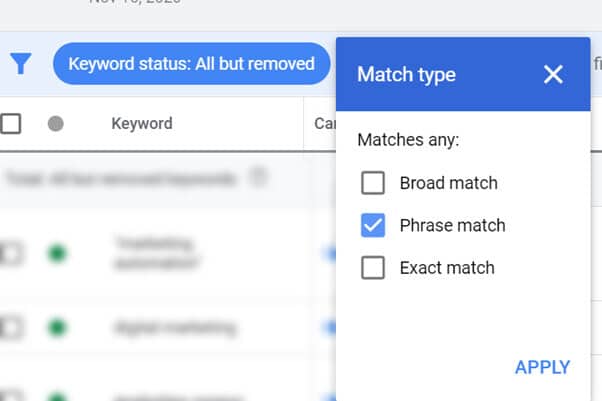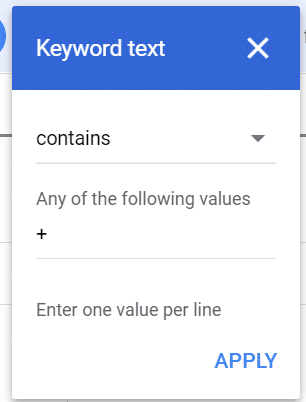Subheading
Last week Google announced some significant changes to match types. This is a big deal: the last major change to match types was the introduction of broad match modifier back in 2010. So this is a once-in-a-decade event.
On this page:

What next for match types for B2B search advertisers?
In B2B search marketing we often need fine-grained control over search terms to deliver acceptable ROI from search campaigns, and match types are a key tool in maintaining that control. So while Google’s changes will have big implications for most search advertisers, they are particularly significant for B2B search marketers.
In this post I will outline the changes that are happening and some steps that B2B search marketers should take right away to ensure their Google Ads setup remains cost effective.
What is Google changing?
Google is combining two existing match types, phrase match and broad match modifier (sometimes called modified broad match and abbreviated “BMM” or “MBM”).
Phrase match keywords are written with quotation marks like this: “b2b digital agency”.
Broad match modifier keywords are written with a plus sign, like this: +b2b +digital +agency
Prior to the recently-announced change, phrase match required a search term that contained all of the same words and in the exact order, matching the full “phrase” in the keyword. So for example:
Broad match modifier provided more flexibility in the search term – the words must all be present, but they do not need to be in the same order. So:
There are some nuances around this. In particular, both match types allow some flexibility for words with similar meanings. So for instance:
Once the recently-announced change has been completed, the old BMM syntax (with the +keyword signs) will disappear. The old “phrase match” syntax remains, but with a very important difference:
The new phrase match is (more or less) the same as the old BMM (!)
So for example:
There are some slight differences between old-style BMM and new-style phrase match. In particular Google says that the word order will be significant in deciding whether to match, in some cases. But the differences are quite minor. For more detail, see this Google help article.
So while this announcement has been reported as “Google is retiring Broad Match Modifier”, the truth is a bit more nuanced:
- Google is retiring the old BMM syntax, with the +keyword signs.
- There is a new-style phrase match, which behaves very similarly to the old-style BMM (with some subtle differences)
- There will be no way to recreate the behaviour of the old-style phrase match.
It would be more accurate to say that phrase match is being retired, and BMM is being renamed!
When is this happening?
Google’s announcement says that the keyword behaviour “will begin to transition…starting mid-February [2021]”. The change will be applied to a list of 8 languages (including English) first, with other languages following along later.
So keep an eye for a further announcement or a Google Ads account alert to tell you that the change has gone into effect. It may still be a few weeks or even months before this behaviour switches over for your account.
Another key date is July 2021 – Google says that, by then, the change will have been rolled out globally, and it will then no longer be possible to create new keywords with the old-style BMM syntax.
What should B2B search marketers do about this change?
Bear in mind that this change mostly impacts phrase match. So your action plan depends on how heavily you use old-style phrase match in your Google Ads accounts.
Start by auditing your Google Ads accounts and see how important phrase match keywords are to you at the moment. You can do this in two ways:
- Simply count how many phrase match keywords you have as a percentage of all of the active keywords in the account; or
- Count the fraction of total account impressions, clicks and spend that is allocated to phrase match keywords.
The first approach is easier but may over- or under-state the importance of phrase match if, for example, you have a lot of phrase match keywords that have very low search volumes. The second approach is slightly more complex to do, but still only a few minutes’ work with a suitable spreadsheet, and will give you a more robust view.
Quick tip: there’s a convenient “Match Type” filter in Google Ads that makes it easy to separate out your phrase match keywords:

Interestingly there is no BMM setting in this filter – BMM keywords are currently combined with broad match. If you want to filter for BMM, here’s a trick you can use:

Here are the steps I recommend:
- For your existing phrase match keywords: be aware that their matching behaviour is going to change significantly, and this may bring in bad matches that could harm the ROI of the associated campaigns. So as soon as Google’s change has been implemented, monitor these phrase match keywords closely and be ready to adjust bids, add negative keywords and perhaps even remove some keywords altogether.
- Existing BMM keywords won’t change their behaviour very much, but there are some nuanced differences. So you should still audit and monitor these keywords in case the small differences catch you out. In particular if you work with a lot of searches where the word order is significant to you, you may need to make some changes here.
- If you currently have a campaign with both phrase match and BMM keywords that are otherwise identical – for example if you bid on both “b2b agency” and +b2b +agency – then these are going to behave as exact duplicates. It would make sense to pause the BMM versions of these keywords as soon as you know the change has been implemented. (Duplicate keywords have no benefits and just cause headaches for account maintenance and performance analysis.)
- As soon as you know that the change has been implemented for your accounts, stop using the outgoing +keyword BMM syntax for any new keywords that you create. Use the “phrase match” syntax instead. (Although you CAN still continue to use the BMM syntax until July, it will be retired soon anyway, so why create a problem for the future?)
- Consider a planned account update to switch out your existing +keyword BMM keywords for phrase match. This isn’t essential: the old BMM syntax will continue to work indefinitely as a synonym for phrase match. But because it will soon become impossible to create keywords with the old BMM syntax, in the long term these keywords will become a headache for account maintenance. So a planned retirement of the +keyword syntax makes sense. Ideally, work to complete this before the July deadline.
If you are unlucky enough to currently make heavy use of phrase match, consider a more strategic review of your keyword strategy – it may be that you need to make more substantial changes to your keyword mix.
What are the wider implications of this change for B2B search marketers?
B2B search marketing often relies on very nuanced use of keywords. If matching is too broad, it is very easy to bring in a lot of expensive clicks from irrelevant matches, and so destroy the ROI from a campaign. So any change to match types is naturally a concern and needs to be assessed carefully by search marketers.
But on the whole I think this is a sensible rationalisation of match types. At Sharp Ahead, we’ve rarely needed to use much phrase match in the Google Ads accounts that we manage for our clients. We find that in most cases, BMM gives a good balance between specificity and reach, and allows us to design campaigns that give great ROI. So the old-style phrase match isn’t much of a loss.
There are a few nuanced cases where we’ll need to change our approach. For instance the mixing of BMM and broad match keywords like this:
+b2b digital agency
…won’t work any more – the whole keyword has to be phrase match. But on the whole, the changes will be minor. We just have to get used to the new terminology! Just remember:
+Broad +Match +Modifier is dead.
Long live “Broad Match Modifier”!
On this page:
Subscribe
Everything B2B Marketers Should Know about LinkedIn Content Creators
How you can transform your C-suite and employees into LinkedIn Content Creators—and why it’s a good idea.
GEO Best Practice: Authority and Answers
Learn how to build authority and craft AI-ready answers with GEO (Generative Engine Optimization) — a must-know for B2B marketers.
Preparing for AIOs and Agentic Search: Top Tips for B2B Marketers
AI is changing the world fast and SEO is no exception. Here’s how to start preparing for AIOs and agentic search now.



